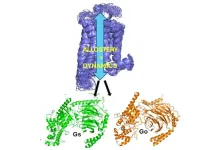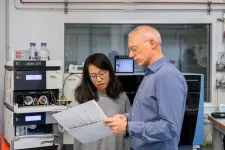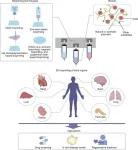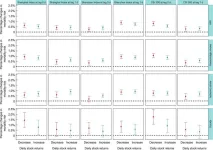(Press-News.org) A clinical trial at Oregon Health & Science University suggests that a subset of older adults with a genetic predisposition to Alzheimer’s disease may benefit from fish oil supplements.
The study published today in the journal JAMA Network Open.
The results come amid claims that fish oil supplements can improve brain function in people with memory problems. The study found no statistically significant benefit for all older adults in general. However, among those enrolled in the study who also carry a gene associated with Alzheimer’s disease, it showed a reduction in the breakdown of nerve cells in the brain.
The study’s senior co-author from OHSU indicated that fish oil may be worthwhile for people who carry the APOE4 gene, which indicates a higher risk of developing Alzheimer’s, but not necessarily for all older adults.
“Our findings showed that over three years, there was not a statistically significant difference between placebo and the group that took fish oil,” said Lynne Shinto, N.D., M.P.H., professor of neurology in the OHSU School of Medicine. “I don’t think it would be harmful, but I wouldn’t say you need to take fish oil to prevent dementia.”
The study enlisted 102 participants who were 75 years old or older who had relatively low blood levels of omega-3 fatty acids, which are found in fish oil. Participants underwent magnetic resonance imaging, or MRIs, of their brains first as they were enrolled and then again at the conclusion of the three-year study, to assess the amount of change in white matter lesions in the brain. These lesions may inhibit the delivery of nutrients through blood vessels to the brain, which raises the risk of developing dementia later in life.
Participants enrolled in the study had relatively high levels of white matter lesions but were otherwise healthy, with no dementia.
Half of the participants took omega 3-enriched fish oil supplements each day while half took a soybean-based placebo. The two MRIs measuring the degree of white matter lesions at the beginning and end of the study period found a slight reduction in the progression of these lesions — but not enough to be statistically significant between the two groups.
Among APOE4 carriers, however, researchers measured a dramatic reduction in the breakdown of brain cell integrity as soon as one year after treatment with the fish oil, compared with the soybean oil group.
“This is the first dementia prevention trial to use modern prevention tools, such as a blood test and brain scan, to identify not only people at high risk for dementia, but also those well-suited to receive a specific nutritional intervention,” said Gene Bowman, N.D., M.P.H., director of clinical trials and instructor of neurology at the McCance Center for Brain Health, Massachusetts General Hospital and Harvard Medical School. “The fact that neuronal integrity breakdown was slowed in people randomized to omega-3 treatment who are also at high risk for Alzheimer’s disease is remarkable, and warrants a larger clinical trial in more diverse populations in the future.”
Bowman previously worked at OHSU, where the clinical trial was conducted.
In addition to Shinto and Bowman, co-authors from OHSU include Charles F. Murchison, Ph.D., Lisa C. Silbert, M.D., MCR, Hiroko H. Dodge, Ph.D., David Lahna, M.S., William Rooney, Ph.D., Jeffrey Kaye, M.D., and Joseph F. Quinn, M.D.
The study was supported by the National Institute on Aging of the National Institutes of Health grant awards R01AG043398, P30AG008017 and P30AG066518; the National Center for Advancing Translational Sciences of the NIH award to the Oregon Clinical and Translational Research Institute at OHSU, grant award UL1TR002369; and the NIH Office of the Director, grant awards S10OD021701, S10OD018224 and S10OD016356 for shared instruments housed in OHSU’s Advanced Imaging Research Center. The content is solely the responsibility of the authors and does not necessarily represent the official views of the NIH.
END
Study examines effect of fish oil in older adults’ brains
OHSU clinical trial finds statistically significant benefit for those genetically predisposed to Alzheimer’s
2024-08-01
ELSE PRESS RELEASES FROM THIS DATE:
Conformational dynamics and allostery elucidate how GPCR couple to multiple G-proteins, offering mechanistic insights into coupling-promiscuity and novel drug discovery strategies
2024-08-01
In a groundbreaking study, a multinational research team led by Dr. Adnan Sljoka (RIKEN) and Prof. Akio Kitao (Tokyo Tech), in collaboration with Prof. Scott Prosser (University of Toronto), has carried out experimental and computational studies to elucidate the mechanisms behind G protein selectivity and efficacy in the human adenosine A2A receptor (A2AR). A2AR is a member of major drug targets G protein-coupled receptor (GPCR) superfamily, which engages the G protein and initiates cell signaling, influencing heart health, inflammation, cancer, and brain diseases. Scientists have ...
Proteins as the key to precision medicine: Finding unknown effects of existing drugs
2024-08-01
Fewer side effects, improved chances of healing: the goal of precision medicine is to provide patients with the most individualized treatment possible. This requires a precise understanding of what is happening at the cellular level. For the first time, researchers at the Technical University of Munich (TUM) have now succeeded in mapping the interactions of 144 active substances with around 8,000 proteins. The results could help to identify previously unknown potential benefits of existing drugs.
Practically all drugs either affect, produce or eliminate proteins – or are, in fact, proteins. But what exactly happens when a high or low dose is taken? And what is going ...
Cheese of the future: Consumers open to animal-free alternatives
2024-08-01
Companies and institutes are currently working on biotechnological processes for the production of dairy products without the use of cows: In so-called precision fermentation, egg and milk proteins are produced with the help of bacteria, yeasts or other fungi. This results in foods such as milk or cheese with a familiar flavour and texture. Supporters hope that this will lead to more sustainable food production, as nutrient-rich proteins can be produced using fewer resources. But will consumers accept such products? Researchers at the University of Göttingen have found that a large proportion of German consumers are willing to try and buy cheese produced in this way. ...
New Moffitt study explores how antifragility could revolutionize cancer treatment
2024-08-01
TAMPA, Fla. — Researchers constantly seek innovative approaches to tackle cancer. One concept gaining traction is antifragility, a property where systems not only withstand stress but improve because of it. In cancer research, this concept is particularly relevant for tumors that adapt and evolve in response to treatment. Understanding antifragility could lead to more effective therapies. In a new study published in npj Complexity, Moffitt Cancer Center researchers offer a new perspective on antifragility, proposing ...
Advances in 3D organ bioprinting: A step towards personalized medicine and solving organ shortages
2024-08-01
In a latest review published in Engineering, an international team of scientists from China and the United States has presented a comprehensive analysis of the latest advancements in 3D organ bioprinting. This innovative technology holds the potential to revolutionize regenerative medicine and tackle some of the most pressing issues in organ transplantation.
Organ damage or failure, whether resulting from injury, disease, or aging, poses a significant challenge due to the body’s limited natural regenerative capabilities. Traditional organ transplantation, while lifesaving, is fraught with difficulties including donor shortages and the risk of immune rejection. This has spurred a ...
China forges ahead with technological innovations in large-span arch bridge construction
2024-08-01
The field of bridge engineering is witnessing a transformative era, as China leads the way with its recent advancements in constructing large-span arch bridges. Jielian Zheng, the member of the Chinese Academy of Engineering from Guangxi University, has authored a research article in Engineering, titled “Recent Construction Technology Innovations and Practices for Large-Span Arch Bridges in China.” The article elucidates the significant strides made in the construction of concrete-filled steel tubular (CFST) and steel-reinforced concrete (SRC) ...
External mentorship key in encouraging trainees to pursue classical hematology
2024-08-01
(WASHINGTON, August 1, 2024) — In a year-long pilot program, external mentorship increased confidence, furthered career development, and facilitated networking opportunities for trainees in classical hematology, according to a study published in Blood Advances.
Classical hematology, the study of non-cancerous blood disorders such as sickle cell anemia and thrombotic and hemorrhagic disorders, is projected to face a significant workforce shortage in the coming years. The American Society of Hematology’s (ASH) previous surveys of hematology/oncology program ...
Tiny flyers with large impact: Blowflies carry bird flu virus
2024-08-01
Fukuoka, Japan – Researchers from Kyushu University have discovered that blowflies, a family of flies strongly attracted to decaying flesh and feces, are carrying the bird flu virus in southern Japan. Their findings, published in Scientific Reports, introduce a potential new route of transmission for bird flu and highlight the need to develop new countermeasures to prevent and control the disease in poultry farms.
Since 2020, bird flu has been spreading rapidly around the globe, leading to the death of millions of wild birds and the culling ...
Stock market turbulence linked to increased risk of heart attacks, strokes, and suicide: A groundbreaking study analyzes 12 million deaths
2024-08-01
In a recent study published in Engineering, a team of Chinese researchers has uncovered a startling correlation between stock market volatility and the risk of major adverse cardiovascular events (MACEs) and suicide. The research, which analyzed over 12 million deaths across China from 2013 to 2019, provides compelling evidence that the psychological stress induced by stock market fluctuations has severe and immediate health implications.
The study, titled “Stock Volatility Increases the Mortality Risk of Major Adverse Cardiovascular Events and Suicide: A Case-Crossover Study of 12 Million Deaths,” is a wake-up call for investors, ...
Judging your own happiness could backfire
2024-08-01
Judging how happy you are could backfire and negatively impact life satisfaction and psychological well-being, according to research published by the American Psychological Association.
In three experiments comprising more than 1,800 participants, researchers found that having concerns or judgments about one’s own level of happiness were associated with lower well-being, due in part to greater negativity and disappointment about positive events.
The research was published in the journal Emotion.
Thinking too much about one’s own level of happiness could be related to fears about not measuring up or not being as happy as other people, said lead researcher Felicia ...
LAST 30 PRESS RELEASES:
COVID-19 vaccination during pregnancy may help prevent preeclampsia
Menopausal hormone therapy not linked to increased risk of death
Chronic shortage of family doctors in England, reveals BMJ analysis
Booster jabs reduce the risks of COVID-19 deaths, study finds
Screening increases survival rate for stage IV breast cancer by 60%
ACC announces inaugural fellow for the Thad and Gerry Waites Rural Cardiovascular Research Fellowship
University of Oklahoma researchers develop durable hybrid materials for faster radiation detection
Medicaid disenrollment spikes at age 19, study finds
Turning agricultural waste into advanced materials: Review highlights how torrefaction could power a sustainable carbon future
New study warns emerging pollutants in livestock and aquaculture waste may threaten ecosystems and public health
Integrated rice–aquatic farming systems may hold the key to smarter nitrogen use and lower agricultural emissions
Hope for global banana farming in genetic discovery
Mirror image pheromones help beetles swipe right
Prenatal lead exposure related to worse cognitive function in adults
Research alert: Understanding substance use across the full spectrum of sexual identity
Pekingese, Shih Tzu and Staffordshire Bull Terrier among twelve dog breeds at risk of serious breathing condition
Selected dog breeds with most breathing trouble identified in new study
Interplay of class and gender may influence social judgments differently between cultures
Pollen counts can be predicted by machine learning models using meteorological data with more than 80% accuracy even a week ahead, for both grass and birch tree pollen, which could be key in effective
Rewriting our understanding of early hominin dispersal to Eurasia
Rising simultaneous wildfire risk compromises international firefighting efforts
Honey bee "dance floors" can be accurately located with a new method, mapping where in the hive forager bees perform waggle dances to signal the location of pollen and nectar for their nestmates
Exercise and nutritional drinks can reduce the need for care in dementia
Michelson Medical Research Foundation awards $750,000 to rising immunology leaders
SfN announces Early Career Policy Ambassadors Class of 2026
Spiritual practices strongly associated with reduced risk for hazardous alcohol and drug use
Novel vaccine protects against C. diff disease and recurrence
An “electrical” circadian clock balances growth between shoots and roots
Largest study of rare skin cancer in Mexican patients shows its more complex than previously thought
Colonists dredged away Sydney’s natural oyster reefs. Now science knows how best to restore them.
[Press-News.org] Study examines effect of fish oil in older adults’ brainsOHSU clinical trial finds statistically significant benefit for those genetically predisposed to Alzheimer’s





